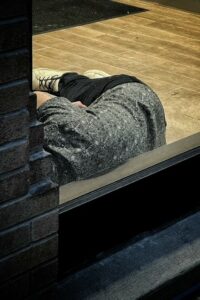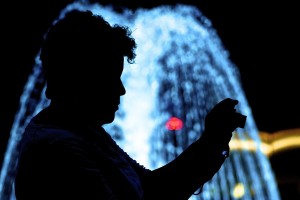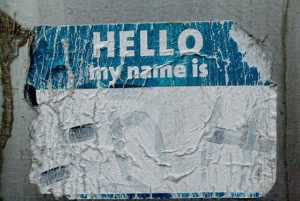
It is not the first time I have seen him ( or others like him) pressed into a cold corner in the bank’s vestibule, seeking some sort of shelter from the rain.
It’s early, and I have just left the eternal comfort of my cozy bed and am walking the 1,200 or so steps to a familiar coffee shop with a sturdy seat and hot, overpriced coffee. It is a luxury I can afford: I’ve got a handful of change or fresh bills in my wallet that allow me a bit of time with myself, my thoughts, and my journal.
Despite my personal issues, concerns, and ever-evolving difficulties, I’ve got it pretty good. I have a place to call home, a purpose, and what I would call a meaningful life.
Others are not as fortunate. I am keenly aware of the imbalance.
This morning’s display of a fellow human being splayed out on a convenient concrete floor is more than a subtle reminder that there are people suffering daily in this city and country.
It is a difficult world.
In my charitable ways, I make monthly donations to a local shelter. I occasionally, have spare pocket change for some of the many panhandlers who dot my landscape. It is not enough, obviously, but I feel I do what I can.
I could do more.
We all could do more (or most of us).
The problems here are not unique to Toronto.
We are in the midst of a mayoralty by-election in this city, the fourth largest in North America. There is a hole in the budget large enough to slip a lesser-sized city into. There are a lot of candidates listing a lot of solutions to what they see as top-end concerns. In neatly-packaged sound bites, they speak in general terms of what they would do to make this a better place to live, but so many politicians are short on specifics.
They talk about “affordable housing” and a need to address the over-priced, undernourished economy. The verbiage they offer is only noise.
When politicians speak of “affordable housing” they are talking about $250,000 condominiums in a city where the market average is $726,664.
They are talking above the heads, and budgets, of those who may never be able to afford their own home and can’t afford the historically high rents.
Clearly and consistently the politicians fail to address social housing, now more than a necessity as city shelter spaces are above capacity. Those turned away are forced to camp out in parks or find a corner by some bank machine to try and get a little shut eye.
There are few and fewer options in this city and even less of a response or the political will. Toronto is not facing a housing crisis as much as we are smack dab in the middle of a humanitarian crisis.
We simply are not, or cannot, take care of each other
Or we don’t even try.
©2023 j.g. lewis




